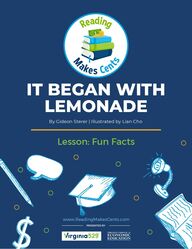
Return to flip book view
PRESENTED BYLesson: Fun FactsIT BEGAN WITHLEMONADEBy Gideon Sterer | Illustrated by Lian Chowww.ReadingMakesCents.com
STORY SYNOPSIS: From New York Times bestselling author GideonSterer is an imaginative, colorful tale of making(and selling!) lemonade from life’s lemons is nottoo sour and not too sweet.One scorching hot summer day, a spunky younggirl decides to sell lemonade . . . only to find thereare too many other young entrepreneurs on herstreet with the same idea. So she sets off with herlemonade stand and ends up at the river’s edge,where she discovers a most unexpected, quirky,and very thirsty clientele.It Began With LemonadeBy Gideon Sterer | Illustrated by Lian ChoPenguin Random House/2021Lesson Plan By:Lynne Stover stoverlf@jmu.eduLauren Shifflett shiffllh@jmu.edu
Lesson Plan By:Lynne Stover stoverlf@jmu.eduLauren Shifflett shiffllh@jmu.edu Explain to the students that a lemon is a natural resource, something that comesdirectly from nature. Create a class book titled Fruits and Vegetable A-Z. Assign thestudents different letters of the alphabet to list and illustrate these natural resourcesbeginning with that specific letter.Social Science and History2.13 The student will apply history and social science skills to understand basiceconomic principles by a. identifying natural resources (water, soil, wood, andcoal), human resources (people at work), and capital resources i.e. manmadethings used in production (machines, tools, computers, and buildings);Draw a t-graph on the board. Write “Wants and Needs” above it. Label one columnSUMMER and the other WINTER. Ask the students for suggestions of wants andneeds that are unique to each season. Record their suggestions. When at least tenitems for each column have been recorded, ask them to revisit what you have writtenand circle the THREE things they consider the most important and to be prepared toexplain their choices. Discuss as a class. [Most often the three choices will be needs.]Social Science and History2.13 The student will apply history and social science skills to understand basiceconomic principles by b. distinguishing between needs and wantsInstruct the students to read the facts provided on the Lemonade Fact Sheet. Tellthem to select one and write an opinion that they have about this fact. [An opinion isa view or judgment formed about something.] Encourage them to share theiropinions with the class.English4.7 The student will write in a variety of forms to include narrative, descriptive,opinion, and expository.j) Express an opinion about a topic and provide fact-based reasons for support. ENRICHMENT ACTIVITIES SUPPORTING THE VIRGINIA STANDARDS OFLEARNING: Reading Makes Cents 2023-2024It Began with Lemonade Fun Facts
LEMONADE IS MADEAROUND THE WORLD.Lesson Plan By:Lynne Stover stoverlf@jmu.edu & Lauren Shifflett shiffllh@jmu.edu Reading Makes Cents 2023-2024It Began with Lemonade Fun FactsLEMONADEfactsfactsA SINGLE LEMON TREE CANPRODUCE UP TOPOUNDS OF LEMONS INJUST 1 YEAR.500 or 600500 or 600LEMONADE ISSCIENTIFICALLYTHIRST-QUENCHING.CALIFORNIAANDARIZONAPRODUCE OF THEENTIRE U.S. LEMONCROP.95%95%DIFFERENTLYTHE “ADE” INLEMONADE MEANS THEPRODUCT IS NOT 100 PERCENT JUICE.